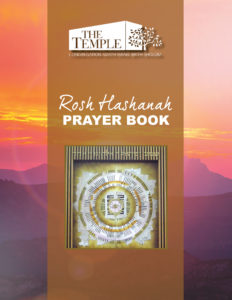By Lee Chottiner and Michael Ginsberg
Community Staff

The covers of the customized prayer books, which The Temple will use during its virtual High Holy Day services
 For this year’s High Holy Day observances, you could say some rabbis have written the book, or at least compiled it.
For this year’s High Holy Day observances, you could say some rabbis have written the book, or at least compiled it.
In the case of The Temple, Rabbis Joe Rooks Rapport and David Ariel-Joel have compiled a two-volume set of prayer books, one each for Rosh Hashanah and Yom Kippur, with brevity and reading selections to reflect observance of the Days of Awe online during a dangerous pandemic..
The Temple published its own customized prayer books (52 pages for the Rosh Hashanah volume, 120 pages for Yom Kippur), to make the service “flow more smoothly,” as Rapport said, while giving worshippers experiences that are familiar and not electronic.
“There’s something really different about holding the prayer book in your hand that will connect the prayer to the reader and to the congregation they’re sharing the service with,” he said.
The book project is one of many ways Louisville’s synagogues will creatively observe the High Holy Days during coronavirus/COVID-19 pandemic.
Following advice from medical experts, most synagogues here are keeping their buildings closed and designing services for virtual prayer.
No two synagogues will conduct services the same way. For instance, The Temple is planning a live tashlich service at Captain’s Quarters. Adath Jeshurun and Temple Shalom are encouraging their worshippers to do it on their own and providing guidance. Keneseth Israel will hold a Zoom service.
Most are truncating the liturgy, tacitly acknowledging that most worshippers will not livestream for more than two hours.
And during the actual services, some synagogues will have their rabbis and cantors together on the same bima. Keneseth Israel will have its clergy perform their roles from separate sanctuaries.
“This is uncharted territory,” said Rabbi Robert Slosberg of Adath Jeshurun. “They did not teach us this in rabbinical or cantorial school, [but] we’re going to give it our best shot.”
Anshei Sfard and Chabad will hold in-person services in their buildings, though Anshei Sfard Rabbi Simcha Snaid also said services “will look different.” Their length is still under discussion.
All synagogues are planning to at least conduct their services from their buildings, so rabbis and cantors will be there. In some cases, so will the presidents, a choir, accompanists and those acting as technical producers for the services.
Here are some ways Louisville synagogues will reach worshippers during the Days of Awe. See page 15 for service times.
Adath Jeshurun
Intergenerational and main sanctuary services will be combined this year, with Rabbi Robert Slosberg, Rabbi Laura Metzger and Cantor David Lipp officiating together in the main sanctuary to keep the experience as normal as possible.
The service will be divided into the main service, followed by a family service and Torah/musaf.
“We’re juggling the reality that we don’t want – people spending hours by their computer screen – with the highlights of the service and yet having people feel this is still a traditional service,” Slosberg said.
As a rabbi, he said that delivering sermons this year will be challenging without hearing congregational reactions.
“It’s hard to feel reaction when connecting to an audience you can’t see, Slosberg said. “The stuff I deal with [in my sermons] deals with people’s lives.”
Standard prayer books, which Slosberg says give him more options, will be used, and a donor has offered to subsidize the cost of the books for any member who wishes to purchase theirs. Another donor is paying for the installation of streaming equipment in the sanctuaries.
While seats will not be sold this year, many have made voluntary contributions.
“I’m really proud of the congregation. This has been one of our great accomplishments,” he said. “It may be our greatest accomplishment.”
Keneseth Israel
Cantor Sharon Hordes will conduct services with Temple Shalom Rabbi Emeritus Rabbi Stan Miles this year.
Like The Temple, KI had considered compiling its own prayer book this year, but opted for a PDF machzor offered by Rabbinical Assembly.
“It’s a PDF of the Lev Shalom machzor,” Hordes said. “It’s an exact digital copy that people can download and use at home if they wish.”
This year’s abbreviated services also will include pre-recorded services for congregants who do not have access to computers, tashlich on Zoom and a yizkur slide presentation.
“We’re asking people to send in digital photos of their parted ones,” Hordes said. “We will show the photos as a slide show.”
Temple Shalom
Rabbi Beth Jacowitz Chottiner, Cantor Wendy Autenrieth and accompanist Shawn Dawson will lead services from the building.
The rabbi and cantor also will lead children’s service on both holy days, suing a new pray book for kids; Storytellers will recount holiday takes on Yom Kippur after and Dawson will do a classical music performance.
While costs of producing services have actually increased during the pandemic, reservation fees will stay the same, she added.
In memory of Temple Shalom member Barry Berlin, who died from complications resulting from COVID-19, congregants may participate in a High Holy Day tzedakah project – Berlin’s idea. Temple Shalom tzedakah cans – one per family – are available at the office.
The Temple
Each family is receiving everything it needs for the High Holy Days in a single bag.
Each bag contains a set of the new prayer books, a mini challah, a yahrzeit candle, honey candy, even an HDML cable so members can hook their laptops to their big screen TVs.
Children’s services, which will be have Dr. Seuss and Wild Thing themes, will be held on Zoom, as will Havdalah. Main services will be streamed.
“We’re trying to engage our members as much as we can,” Director Craig Goldstein said.
That’s especially true for the new prayer books, which were printed thanks to donations from the Temple’s WRJ/Sisterhood and its Brotherhood.
Ariel-Joel said the text of the prayer books is eclectic, drawing from 20 sources.
Asked if this set could become the standard prayer books for future High Holy Days, he was adamant. “No,” he said.
“It’s made for streaming, it’s designed for shorter High Holy Day services because of streaming,” he said.
But Ariel-Joel predicted that the pandemic will change the way Jews pray going forward.
“The Jewish world isn’t going to be same after COVID-19,” he said. “There are going to be changes, and there are scholars in our field who say one of the changes will be shorter services.”
“I really hope we will not have to do purely online streaming again in my lifetime after this is all gone.”


